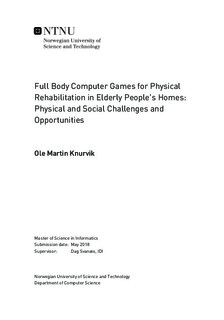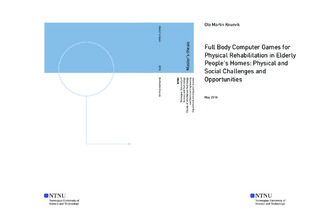| dc.description.abstract | The use of exercise games has proven beneficial and engaging for elderly people. Studies also suggest that rehabilitation programs using exercise games have higher adherence than traditional rehabilitation. With the aging population and growing need for healthcare, there is also an increasing need for solutions which reduces the cost of healthcare. The use of exercise games can help reduce this cost by allowing elderly people to stay active in their own homes. Despite this, little research has been conducted towards how this type of technology can be incorporated into elderly people s homes, and what needs to be taken into consideration when making games for this setting.
This thesis conducts two studies, one field study, and a lab experiment. The field study looks at how elderly people live and furnish their homes, to establish what limitations and possibilities exist when incorporating exergames. The lab experiment will aim to confirm these limitations and possibilities. The experiment also aims to identify differences between game behavior in a simulated home and a more traditional lab setting, and see how exposure to exercise games affect elderly people s attitude towards it.
The field study generated data which was used to make a generalized living room for elderly people, which could be simulated in a lab. It also revealed that most elderly people do not have sufficient available space to play traditional full body computer games without moving at least a table. The lab experiment suggests that people are generally open to move enough furniture to make room for exercise games, given that they want or need it. The lab experiment was not able to detect any differences in game behavior between the simulated home and the traditional lab. The exposure to exercise games was proven to have a positive effect on their attitude towards it, meaning that their interest in this type of technology could increase over time as it becomes more common. | |

